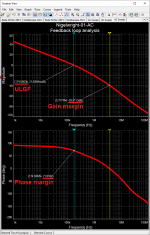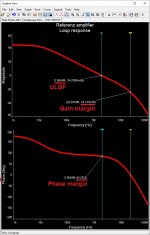I have designed a IGBT amplifier.
Its pretty bog standard circuit with LTP front end into VAS then buffers into IGBT's.
I built up the pcb and tuned the two presets.
I then connected it to a speaker and it sounded fine.
I left it on for about half an hour then suddenly massive hum from speakers.
Both IGBT's had blown.
I removed the IGBT's and the circuit powers up OK and all DC and AC conditions looked OK.
I then turned off a light and the amp burst into 1MHz oscillation.
The VAS has 220pf across BC on transistor which is usually enough to keep the amp stable.
I changed it to 470pf and the amp is now very stable.
It seems some amps can have bandwidths running into 100's of KHz and I get oscillation if the amp bandwidth is only 50KHz !
igbt2 | harrabylad | Flickr
Its pretty bog standard circuit with LTP front end into VAS then buffers into IGBT's.
I built up the pcb and tuned the two presets.
I then connected it to a speaker and it sounded fine.
I left it on for about half an hour then suddenly massive hum from speakers.
Both IGBT's had blown.
I removed the IGBT's and the circuit powers up OK and all DC and AC conditions looked OK.
I then turned off a light and the amp burst into 1MHz oscillation.
The VAS has 220pf across BC on transistor which is usually enough to keep the amp stable.
I changed it to 470pf and the amp is now very stable.
It seems some amps can have bandwidths running into 100's of KHz and I get oscillation if the amp bandwidth is only 50KHz !
igbt2 | harrabylad | Flickr
Last edited:
The band width, top end, is determined by the feedback loop.
The feedback loop is just a simple resistor divider back into LTP.
I have two caps slowing down the signal, one in the VAS 1000pf and another in the lower output driver transistor BC and is 220pf
I have encountered similar oscillations like this and in my case it was an outputstage oscillation.
The outputstage was not like yours but with lateral mosfets and it was cured with a 100 pF ceramic capacity between the gate and drain on the positive side. Other manufacturers have done this as well.
Hope this helps and let me know.
If it works relax other dampening capacities to reduce distortion.
Kind regards.
The outputstage was not like yours but with lateral mosfets and it was cured with a 100 pF ceramic capacity between the gate and drain on the positive side. Other manufacturers have done this as well.
Hope this helps and let me know.
If it works relax other dampening capacities to reduce distortion.
Kind regards.
Hi,
The amount of feedback R17/R14 does seem low.
When simulating i encountered oscillations at these frequencies not using IGBT's, where the solution was a series 100ohm resistor and 1nF capacitor, across the collectors of the LTP.
Maybe simulating the circuit will help ? I use LTspice XVII.
Regards,
Shadders.
The amount of feedback R17/R14 does seem low.
When simulating i encountered oscillations at these frequencies not using IGBT's, where the solution was a series 100ohm resistor and 1nF capacitor, across the collectors of the LTP.
Maybe simulating the circuit will help ? I use LTspice XVII.
Regards,
Shadders.
1MHz oscillation is more likely to be within one stage than round the whole loop. Output stage the most likely.
Exactly - this is most likely some local oscillation that can happen at rather high frequency 1/10/100 MHz regardless of the amplifier's bandwidth.
A few observations if I may...
LTP pair - no degeneration, VAS transistor - no degeneration. Having no degeneration leaves the stage characteristics to chance - you never know what kind of pole may happen at HF (far above the bandwidth). 100R at the emitter is a safe value for a small power transistor, making the stage characteristics much more predictable.
CCS with feedback - it's always good to put some 1nf ceramic capacitor between the bases - sometimes this kind of CCS oscillates by itself (although this arrangement is very good otherwise).
The output stage is not visible, but it also may have some issues leading to its local oscillation - I agree with DF96, that's the most possible source of local oscillation.
Cheers,
Valery
A few observations if I may...
LTP pair - no degeneration, VAS transistor - no degeneration. Having no degeneration leaves the stage characteristics to chance - you never know what kind of pole may happen at HF (far above the bandwidth). 100R at the emitter is a safe value for a small power transistor, making the stage characteristics much more predictable.
CCS with feedback - it's always good to put some 1nf ceramic capacitor between the bases - sometimes this kind of CCS oscillates by itself (although this arrangement is very good otherwise).
The output stage is not visible, but it also may have some issues leading to its local oscillation - I agree with DF96, that's the most possible source of local oscillation.
Cheers,
Valery
Hi,
I think the circuit is already built on the PCB, so maybe simple modifications attached to pins of components is all that is possible ?
Regards,
Shadders.
I think the circuit is already built on the PCB, so maybe simple modifications attached to pins of components is all that is possible ?
Regards,
Shadders.
Hi,
I think the circuit is already built on the PCB, so maybe simple modifications attached to pins of components is all that is possible ?
Regards,
Shadders.
Yes, its already on a pcb.
Hi,
The amount of feedback R17/R14 does seem low.
When simulating i encountered oscillations at these frequencies not using IGBT's, where the solution was a series 100ohm resistor and 1nF capacitor, across the collectors of the LTP.
Maybe simulating the circuit will help ? I use LTspice XVII.
Regards,
Shadders.
I put it in LTSPICE and it works fine.
Hi,
It may be worth trying out the suggestions in the thread, for those ones that can be implemented.
What is the total gain of the amplifier - since others have stated there is no degeneration, then maybe the gain is very high ???
If the light switch turn off caused the oscillation, then is this a power supply induced problem also ? I can hear the fridge turn off sometimes through the amplifier->speakers, but no issue with the amplifier.
Regards,
Shadders.
It may be worth trying out the suggestions in the thread, for those ones that can be implemented.
What is the total gain of the amplifier - since others have stated there is no degeneration, then maybe the gain is very high ???
If the light switch turn off caused the oscillation, then is this a power supply induced problem also ? I can hear the fridge turn off sometimes through the amplifier->speakers, but no issue with the amplifier.
Regards,
Shadders.
Closed loop gain is 47.
With the 1000pf VAS capacitor it works ok now.
I tried turning mains things on and off and it is fine.
With the 1000pf VAS capacitor it works ok now.
I tried turning mains things on and off and it is fine.
More precisely 48 (divider ratio +1) = 33.6db 😉
It would be more interesting to analise the loop gain / phas response.
It would be more interesting to analise the loop gain / phas response.
Nigel, I have quickly simulated your front-end (as I don't see your OPS at the picture). Feedback loop response analysis shows very low ULGF (175KHz) and very low loop gain at 20KHz (around 18db). 1000pF around VAS is huge capacitance. It kills performance. Stability margins are OK, but distortion above a few KHz is not OK. Did you try to see what 20KHz sine wave looks like at the output or measure THD at 20 KHz? Even 100pF would be a lot...
Loop gain curve starts at huge 70db at 20Hz (not shown at the picture) and immediately goes down at around 6db/octave which is ok if descending starts at 10-20KHz, not at 40Hz.
Just as an example, the second picture is the same kind of analyses of a decent amplifier. Loop gain is almost horizontal throughout 20Hz-20KHz (-2db) at the level of 42-40db. Low distortion throughout the whole audio range in combination with good stability margins. ULGF is 1.96MHz (1.5-2MHz is a good range).
Just something to think about 😉
Loop gain curve starts at huge 70db at 20Hz (not shown at the picture) and immediately goes down at around 6db/octave which is ok if descending starts at 10-20KHz, not at 40Hz.
Just as an example, the second picture is the same kind of analyses of a decent amplifier. Loop gain is almost horizontal throughout 20Hz-20KHz (-2db) at the level of 42-40db. Low distortion throughout the whole audio range in combination with good stability margins. ULGF is 1.96MHz (1.5-2MHz is a good range).
Just something to think about 😉
Attachments
I checked on the scope and it goes up to about 20KHz before starting to fall off with 1000pf VAS capacitor.
- Status
- Not open for further replies.
- Home
- Amplifiers
- Solid State
- 1MHz oscillation despite being well damped

